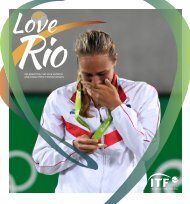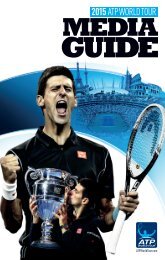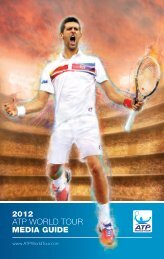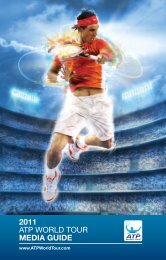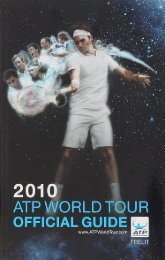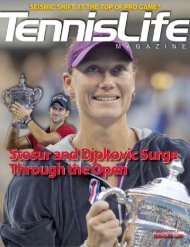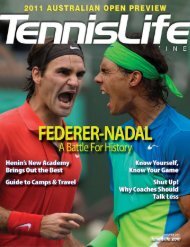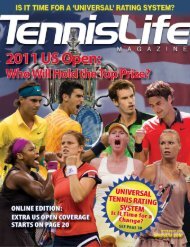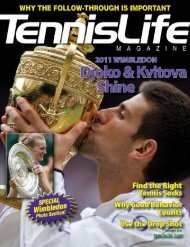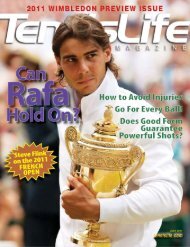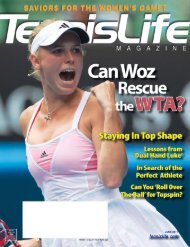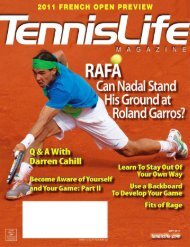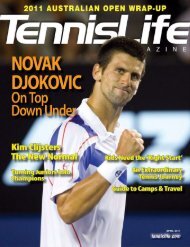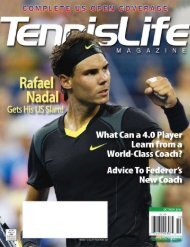A Champion's Mind - Pete Sampras
www.tennismoscow.me Insta:TENNISMOSCOW
www.tennismoscow.me Insta:TENNISMOSCOW
Create successful ePaper yourself
Turn your PDF publications into a flip-book with our unique Google optimized e-Paper software.
his all, he was gritty and very cool under pressure. We had, arguably, the greatest Davis Cup team of all<br />
time—and a pretty stubborn bunch. In the opening ceremony, the promoter wanted us to wear these tengallon<br />
hats and it kind of freaked Jim out. He snapped, “I’m not wearing that stupid hat!” So there were no<br />
cowboy hats.<br />
The Swiss had a very tough two-man team consisting of Jakob Hlasek and Marc Rosset. Both guys<br />
were very good on fast courts, which is unusual because most Europeans prefer the slower clay. So much<br />
for our home-court/fast-court advantage. Hlasek was in the midst of his career year in singles, and Rosset<br />
was a guy with a game as tricky as it was big. He could play serve and volley, even though his career<br />
moment of glory occurred on slow clay a few months earlier, when he won the singles gold medal at the<br />
Barcelona Olympic Games.<br />
Andre won the opening rubber, but then Rosset showed his mettle with an upset of Jim. McEnroe and I<br />
would be playing Hlasek and Rosset in what suddenly looked like a critical doubles match. And when we<br />
lost the first two sets, both in tiebreakers, it looked like tiny Switzerland might pull off one of the most<br />
shocking of Davis Cup upsets—and on U.S. soil, no less.<br />
John was in one of his McEnroe moods. Throughout the match, he trash-talked Hlasek, a very quiet but<br />
cool guy who minded his own business and got along with everyone. John was suffering, and coming<br />
dangerously close to losing control. But then he was unlike anyone else in that he often played better after<br />
going nuts. Some of the line calls in the first two sets seemed dodgy, and in the third set John finally lost it<br />
over another apparent bad call. He started in on the umpire, and he just kept going on. He yelled at the<br />
official, and he yelled at our own captain, Gorman (for not making more of a fuss and “standing up for<br />
us”). He was just going ballistic in general, in any direction he wanted, long after the point in question<br />
was over.<br />
Finally, I just lost it myself. I turned on John and snapped, “John, it’s over. Done with. Let’s not harp on<br />
what happened three games ago, it’s time to move on, man.” For some reason, my own little outburst had<br />
two welcome results. It calmed John down (emotionally, if not verbally) and it fired me up. We won the<br />
third set and adjourned for what was then still the required ten-minute break before the start of the fourth<br />
set. John and I came off the break with wild eyes and fire in our bellies. It was one of those rare<br />
occasions when I got into the emotion of it all. I was pumping my fist and yelling. McEnroe must have<br />
said, “Come on, let’s kick ass” a thousand times. We clawed and fist-pumped and yelled our way to a not<br />
very pretty but extremely relieving win, 6–2 in the fifth.<br />
Although I became very emotional in that match, in general John and I were like a Jekyll and Hyde<br />
pairing; I tended to be cool and forward-looking, he was hot-tempered and all wrapped up in the moment,<br />
always ready for an altercation. He thrived on that, and I understood it. We were good for each other. He<br />
pumped me up with his emotional outbursts, even if I didn’t show it, and I calmed him down with my selfcontrol,<br />
even if he was, externally, still the same contentious, fiery player.<br />
The next day, after Jim beat Hlasek to clinch the tie, I became a Davis Cup champ. It mattered not at all<br />
that I had played only doubles in the final; I had done my share all year and felt as proud and entitled as if<br />
I had played every singles match for the United States in our drive to win the Cup.<br />
But throughout the fall, I kept harkening back to the loss at the Open to Edberg. It was eating away at my<br />
guts. I occasionally thought about what Dad had said a lifetime earlier in Shreveport. I had been a U.S.<br />
Open finalist, sure, but who cared? The guy whom the press—and everybody else—was interested in was<br />
Edberg.<br />
The real giveaway, I came to realize, was that I hadn’t been nervous before the match. There are two<br />
kinds of nervous in tennis: bad nervous, which can make you freeze up, play an inhibited game, or choke,<br />
and good nervous, which is a sign that the match you are about to play really means a lot to you—a sign



